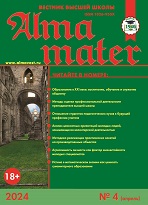UDC 37.09:72
https://doi.org/10.20339/AM.03-21.071
N.S. Zhdanova is Cand.Sci. (Pedagogy), Prof. e-mail: gdnacerg@mail.ru; and A.V. Ekaterinushkina is Cand.Sci. (Pedagogy), Ass. Prof. e-mail: savsof@mail.ru Both at Nosov Magnitogorsk State Technical University. Civil Engineering, Architecture and Arts Institute. Department of Design
A lot has already been written on the problem of the development of students’ creative activity, the experience is described in a number of publications by domestic and foreign authors. All of them recognize that being active is the core of the professional training of any specialist. Design today as a field of activity is in great demand, which significantly increases the requirements for graduates. Employers point out that some of them do not show the necessary responsibility in the design process. There are many reasons for this, but the most often cited are insufficient interest in the outside world, low activity, lack of initiative. Unfortunately, it should be noted that the cognitive activity of students in design engineering has been little studied, and the teaching methodology often has to be borrowed from related disciplines. Finding ways to maintain creativity in design is highly relevant. To study the influence of the freedom of choice of the design topic on cognitive activity, experimental work was carried out with bachelor students, future designers. The experiment proceeded in three stages, each of which had its own tasks and results. The results of the experimental work showed that freedom in choosing a topic is an important factor in teaching methods and has a positive effect on the preservation of students' cognitive activity in educational design and further professional activity.
Key words: cognitive activity, freedom of choice, design engineering, professional responsibility of a designer.
References
- Ekaterinushkina, A.V. Ways of forming students’ professional interest in project activities. Modern trends in fine, decorative and applied arts and design. 2018. No. 2. P. 72–78.
- Zhdanova, N.S. Basics of Design Teaching Methods in High School. Handbook. Magnitogorsk, 2003. 105 p.
- Ivanova, I.V. Freedom and responsibility of the individual as indicators of his self-development. Standards and monitoring in education. 2018. Vol. 6. No. 1. P. 37–45.
- Maralov, V.G., Sitarov, V.A. Pedagogy and psychology of non-violence in education. Handbook. 2 nd ed., add. Moscow: Yurite, 2019.
- Morozova, N.G. To the teacher about cognitive interest. Moscow: Education, 1997. 95 p.
- Musina, V.P. Role of professional activity in reducing feelings of crisis among young people. Alma mater (Vestnik vysshei shkoly). 2016. No. 11. P. 31–37. DOI: 10.20339/AM.11-16.031
- Shchukina, G.I. Pedagogical problems of the formation of the cognitive interest of students. Moscow: Prosveshchenie, 2005.160 p.
- Bulunuz, M., Jarrett, O. S., & Martin-Hansen, L. (2012). Level of inquiry as motivator in an inquiry methods course for preservice primary teachers. School Science and Mathematics, 112(6), 330–339.
- Davis Jean Baptiste, Jennifer Archer & David Palmer (2018): Preserviceteachers’ ideas about how to enhance pupils’ long-term interest in science, Research in Science &Technological Education. DOI: 10.1080/02635143.2018.1543186
- Hascher, T. (2010). Learning and emotion: Perspectives for theory and research. European Educational Research Journal, 9(1), 13–28.
- Hidi, S. 1990. “Interest and its Contribution as a Mental Resource for Learning.” Review of Educational Research 60:549–571. DOI: 10.3102/00346543060004549
- Hongmin, M.A. Influence of interaction of usual affective attributes and learning environments in the classroom for students Situational affective experience in teaching science: Stories of Primary pre-Service Teachers. Research in science Education. 2018. No. 2. DOI: 10.1007/s11165-018-9800-1
- Tytler, R. (2007). Australian education review: Re-imaging science education. Camberwell, Australia: Australian Council for Educational Research.
- Zhdanova, N.S., Ekaterinushkina, A.V., Grigoriev, A.D., Ilyasheva E.V., Pishchugina O.S. Тhe impact integrative model of the project graphics training on the design education. Espacios. 2019. Vol. 40. No. 29. P. 3.











.png)






